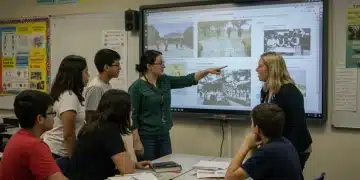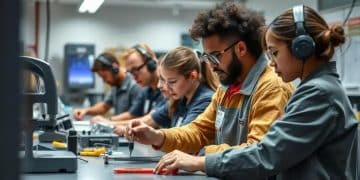Student academic performance trends 2025 are changing
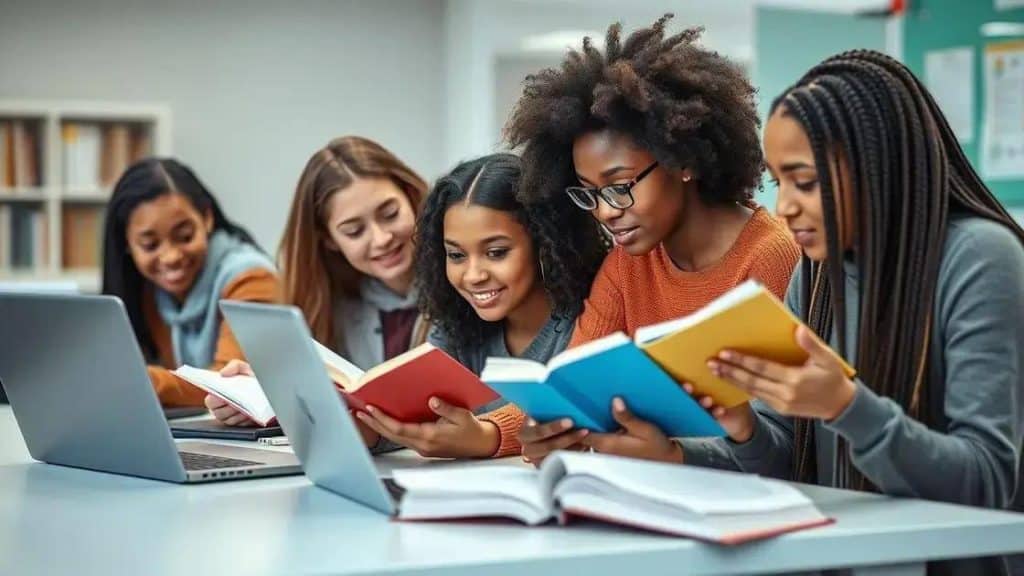
Anúncios
Student academic performance trends in 2025 will be influenced by artificial intelligence, an emphasis on essential skills, and a focus on lifelong learning, reshaping the educational landscape for enhanced engagement and success.
Student academic performance trends 2025 are not just numbers on a report card. They reflect changing dynamics in education, influenced by technology, teaching styles, and more. Have you noticed how students today interact with learning compared to previous generations?
Anúncios
Emerging factors influencing student performance
Understanding the emerging factors influencing student performance is essential in today’s educational landscape. As the world evolves, so do the dynamics of learning. Factors such as technology, mental health, and parental involvement play pivotal roles in shaping how students succeed academically.
Technology’s Impact
Technology now offers various tools that can enhance student learning. These tools not only engage students but also provide access to diverse resources.
Anúncios
- Interactive learning apps
- Online collaboration tools
- Access to online courses and tutorials
- Use of virtual and augmented reality in education
These technology advancements can motivate students and lead to better academic outcomes. However, it is crucial to balance screen time with traditional learning methods.
Mental Health Considerations
Student performance is increasingly linked to mental health. Stress, anxiety, and other emotional challenges can hinder a student’s ability to focus and learn. Support systems in schools play a vital role in addressing these issues.
When students have access to counseling and support, they are more likely to perform well academically. Schools are now focusing on promoting mental well-being alongside academics, creating a more holistic approach to education.
Moreover, fostering a positive classroom environment encourages students to express their feelings and concerns. This approach can lead to improved engagement and performance.
Parental Involvement
Another significant factor is the level of parental involvement in a child’s education. Active participation from parents can greatly affect a student’s motivation and academic success.
- Attending parent-teacher meetings
- Helping with homework
- Encouraging a positive attitude toward education
- Creating a conducive study environment at home
Strong parent support not only boosts a child’s confidence but also reinforces the importance of education, ultimately driving better results.
Technological tools shaping academic success
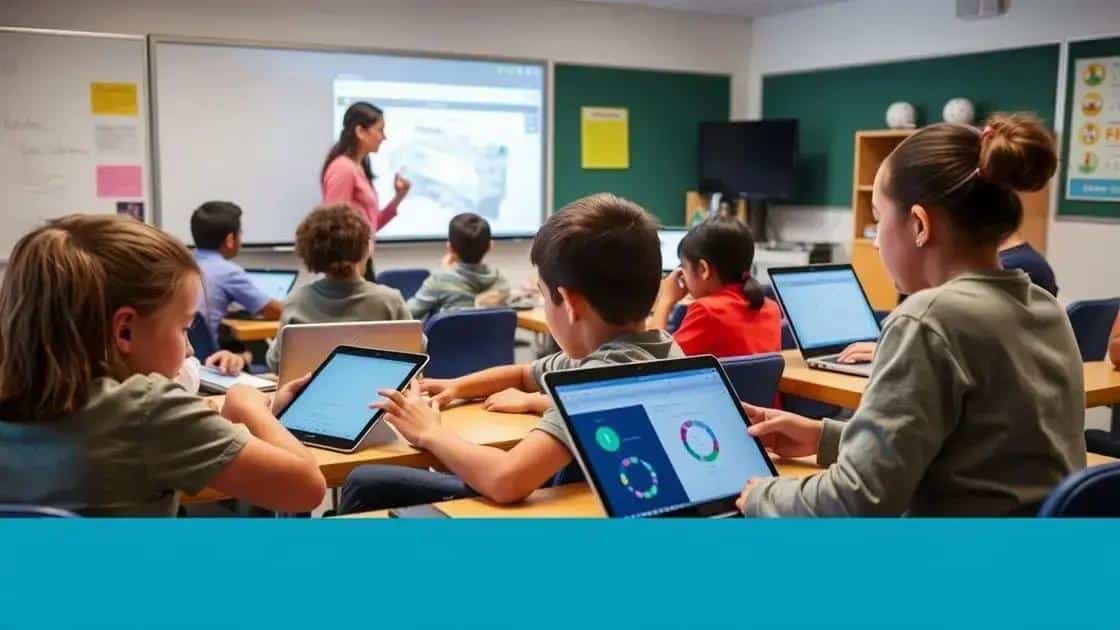
Technological tools are playing a critical role in shaping academic success for students today. These tools enhance learning experiences and make education more engaging. From interactive software to online resources, technology is transforming how students acquire knowledge.
Interactive Learning Platforms
Platforms like educational games and simulation software allow students to learn in an interactive environment. They can practice real-world skills in a virtual setting, making learning both fun and effective.
- Gamified learning experiences
- Simulations of scientific experiments
- Virtual field trips to historic sites
- Collaboration tools for group projects
This kind of learning fosters motivation and retention, making difficult subjects more approachable for students.
Online Resources and E-Learning
The rise of e-learning has given students access to resources that were unavailable in traditional classrooms. They can now engage with a variety of learning materials at their own pace.
Online courses, video tutorials, and educational podcasts provide diverse ways to understand complex topics. This variety encourages students to take charge of their education and explore subjects that interest them.
Moreover, e-learning platforms often include assessments that help students track their progress, tailoring their study approach based on individual needs.
Communication Tools
Effective communication is key to academic success, and technology provides various ways to connect. Students can interact with teachers and peers through chat applications and forums.
- Live chat for instant feedback
- Discussion boards for collaborative learning
- Video calls for one-on-one tutoring sessions
- Social media groups for study support
These tools foster a sense of community and provide opportunities for peer support, enhancing the overall learning experience.
Impact of teaching methods on student engagement
The impact of teaching methods on student engagement is significant and can greatly affect how well students learn. Engaging teaching strategies can capture students’ attention and inspire them to participate actively in their education. Different approaches can lead to different levels of engagement among students.
Active Learning Techniques
Active learning promotes involvement and interaction in the classroom. Techniques such as group discussions and hands-on activities allow students to explore concepts deeply. This approach makes learning more meaningful and encourages students to think critically.
- Group projects that foster collaboration
- Role-playing exercises to understand different perspectives
- Hands-on experiments in science classes
- Problem-solving sessions that enhance analytical thinking
By applying these methods, teachers create an environment where students feel comfortable sharing ideas and challenging one another.
Diverse Learning Styles
Understanding that students have various learning styles is crucial. Some may learn best through visual aids, while others prefer auditory or kinesthetic learning methods. When teaching methods align with these styles, student engagement increases.
Teachers can use a mix of techniques like videos, charts, and interactive activities to reach all learners. This adaptability shows students that their needs are valued and enhances their motivation to learn.
Incorporating Technology
Today, technology plays an essential role in education. Using digital tools can significantly enhance engagement. By incorporating educational apps, online games, and interactive platforms, teachers can make lessons more dynamic.
- Using videos to illustrate complex concepts
- Interactive quizzes to assess understanding in real time
- Online forums for discussion outside of class
- Virtual reality experiences that transform learning
These technologies keep students interested and can lead to deeper understanding and retention of knowledge.
Future predictions for academic achievement in 2025
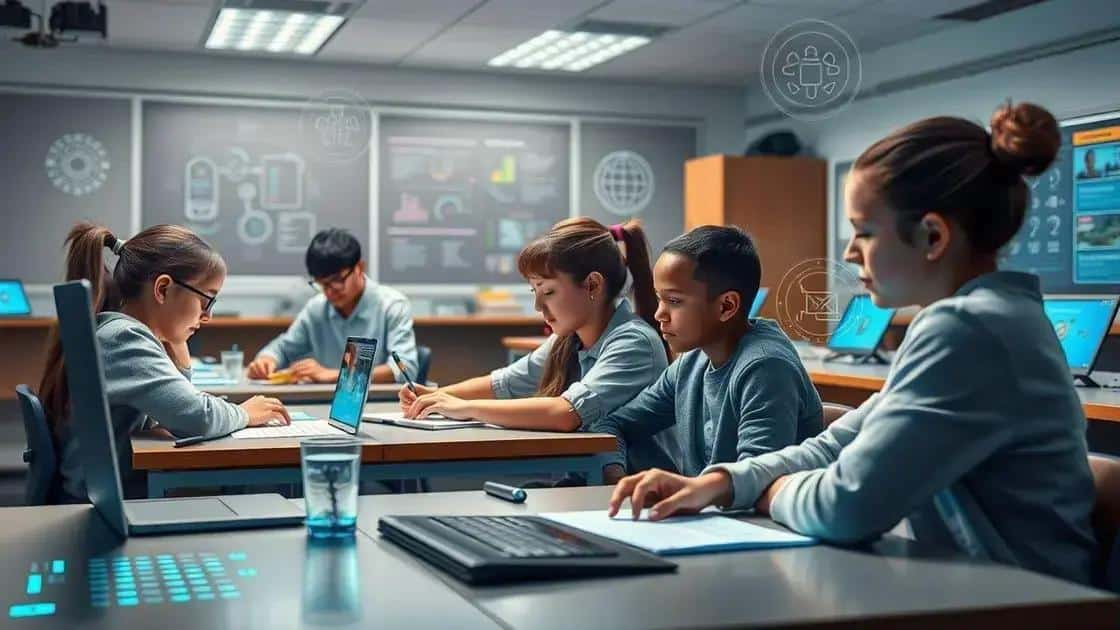
Looking ahead, future predictions for academic achievement in 2025 suggest significant changes in how students learn and succeed. With the rise of technology and evolving educational methods, experts believe that the landscape of education will be dramatically different.
Increased Use of Artificial Intelligence
One of the major trends is the integration of artificial intelligence (AI) in education. AI can personalize learning experiences for students by adapting to their individual strengths and weaknesses.
- Customized learning paths that cater to each student’s pace
- AI tutors providing instant feedback and assistance
- Data analysis to identify learning patterns
- Automated grading systems for efficiency
This personalized approach can lead to improved academic outcomes as students engage with materials tailored to their needs.
Focus on Skills Over Grades
Another important shift is the emphasis on skills rather than just grades. Educators are recognizing that essential skills like critical thinking, collaboration, and creativity are vital for success in the modern world.
Schools will increasingly implement project-based learning and real-world applications of knowledge to help students gain these important skills. Assessments may focus on performance tasks, allowing for a more holistic view of a student’s abilities.
Incorporation of Lifelong Learning Principles
As the job market continues to evolve, the concept of lifelong learning will gain traction. Students will be encouraged to take ownership of their learning journeys, continually seeking knowledge beyond the classroom.
- Access to online courses and resources for ongoing education
- Encouragement of self-directed learning initiatives
- Partnerships with businesses for practical experience
- Community programs that promote continual skill development
This shift towards lifelong learning prepares students not only for exams but for their future careers and personal growth.
In conclusion, as we look toward the future of education, it’s clear that technological advancements and innovative teaching methods will greatly influence student academic performance. By embracing artificial intelligence, focusing on essential skills, and promoting lifelong learning, educators can create engaging environments that foster success. These changes are not just about grade improvement, but also about preparing students for a dynamic world. As we approach 2025, collaboration among educators, students, and technology will be key to achieving these goals.
FAQ – Frequently Asked Questions about Student Academic Performance Trends 2025
How is technology improving student engagement?
Technology enhances student engagement by providing interactive tools and resources that make learning more enjoyable and personalized.
What role does artificial intelligence play in education?
Artificial intelligence helps personalize learning experiences by adapting materials to meet individual student needs and providing instant feedback.
Why is a skills-focused approach important for students?
A skills-focused approach prepares students for real-world challenges by emphasizing critical thinking, problem-solving, and collaboration over traditional grading.
What does lifelong learning mean for students?
Lifelong learning encourages students to continue pursuing knowledge and skills beyond formal education, preparing them for future career opportunities.
